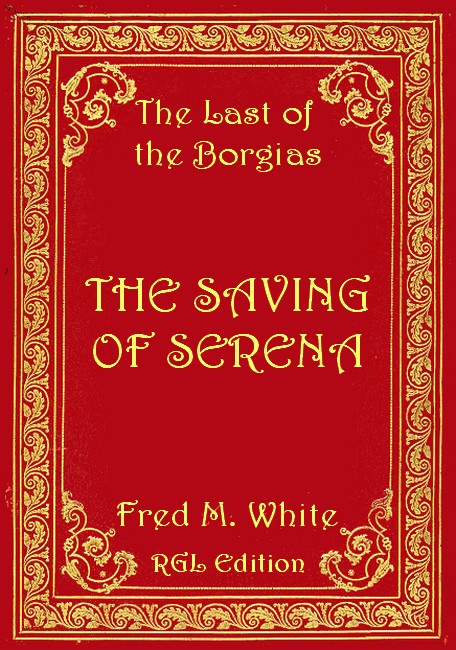
RGL e-Book Cover 2019©

RGL e-Book Cover 2019©

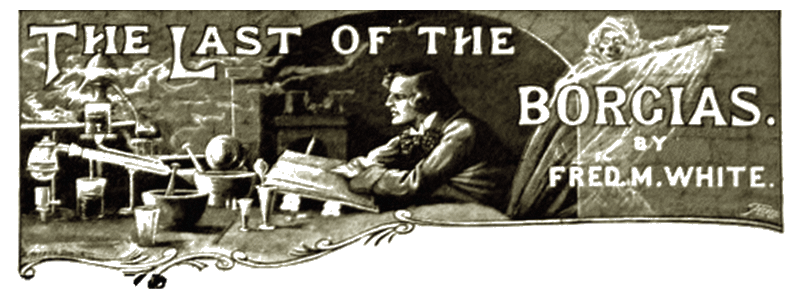
AS the Eastern Grand Express sped on, winding like a fiery snake into the heart of Europe, Colonna sat reading the foreign news in his Times.
"Our special correspondent" was more interesting and less ponderous than usual. And the news from Zeidfort, the capital of Serena, was, to say the least of it, disturbing. As Colonna was proceeding to Zeidfort, he felt the spur of curiosity.
"What will become of our reigning families in another hundred years," he pondered, "if this insane system of intermarriage continues? The criminal folly of it! There is hardly an imperial race in Europe without its taint of insanity, and here is a great nation being destroyed by a hot-headed fanatic who ought to be in an asylum instead of on a throne."
Colonna did not exaggerate. When the young Emperor Ferdinand had come to the purple two years before, he had found Serena one of the most powerful States in Europe. The Empire had not been long in the making, for blood, and brains, and brass were at the front, and a nobler heritage it would be hard to imagine. And then Ferdinand had developed those traces of mingled genius and insanity which promised to change the map of Europe as far as Serena was concerned.
From the most rigid martial tyranny, Ferdinand had gradually drifted into a contrary direction. Serena had been carved out by the sword, her frontiers were scientific ones, and the most peaceful of statesmen could not fail to recognise that Serena depended for her vital breath upon her army. Therefore, when Ferdinand had come out with a hare-brained scheme for disbanding the army, and beating swords into reaping hooks, thoughtful Serenans stood aghast. They learnt with uneasiness that their Sovereign laboured under the delusion that the millennium was at hand, and that he was the instrument designed by Providence to usher in the new era. And Serena was an absolute monarchy.
There were but two political parties in the State—practically those for peace, and those for armed neutrality. A standing army is no cheap toy; the taxes were heavy, and the peace party was an exceedingly strong one. More than once had they carried measures fraught with extreme danger, but, fortunately, the veto of the Senate had rendered them null and void. Therefore, with the cunning of the madman, Ferdinand had set to work to circumvent the fiat of his House of Lords.
For some time past honours and titles had been falling thick and fast in certain quarters. People wondered, but said nothing. And then the point of the plot was revealed. Ferdinand came out as the real leader of the peace-at-any-price party, and his new nominees in the Upper House rendered the passing of the sweeping measure lately introduced in the House of Assembly not only possible, but extremely probable.
Serena thrilled with apprehension. They were a loyal people, and were loth to turn upon one of the loved and revered race which, in fifty years, had made the nation. There was only one man to whom they could look with any hope of rolling back the tide of madness, and he lay slowly dying, worn out with empire- making and the weight of years. Had Prince Frederickshal been in the prime of life, he had crushed this thing out under his iron heel. The old war horse would have carried the Senate with him despite themselves, as he had carried the conquering eagles in the days of yore. In the eyes of Serena, Frederickshal was a god to worship and to follow.
The old man's death-bed promised to be a bitter one. But in vain did he send his manifesto far and wide. The commanding presence, the ringing voice, and the flashing eye were missing. Without them all the rest was as nothing. All this Colonna pondered over as the train panted at length into the Great Eastern terminus at Zeidfort. As he drove along to his hotel he could detect signs of repressed excitement on either side. It only wanted three days more to the time when the Disarmament Bill went up to the Senate for approval. In a few hours more Serena would set the seal to her own undoing.
Once arrived at his hotel, Colonna dismissed the matter from his mind. He was in Zeidfort on business of importance—nothing less than to attend a conference of scientists gathered from all parts of Europe. A great savant was to open the proceedings that evening with a lecture prior to the more serious business of the gathering.
It was late that night before Colonna, tired and sleepy, was back in his own sitting-room again. The sullen roar of the streets subsided to a murmur, the hotel had grown singularly quiet. Therefore Colonna was some what surprised when a waiter entered with the information that a gentleman, who refused his name, had called to see the Doctor on a matter of urgency.
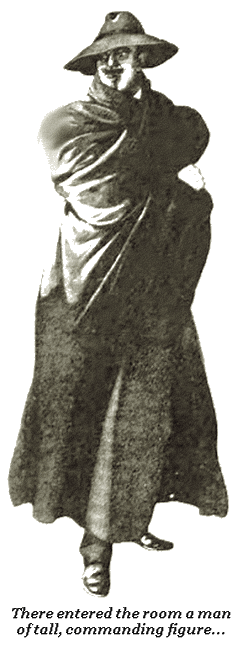
"Show him up," said Colonna wondering. There entered the room a man of tall, commanding figure, perfectly disguised by a long cloak and a soft hat pulled low over the forehead. These he removed directly the waiter had closed the door behind him.
"You will pardon this intrusion," said the stranger, "but it is absolutely necessary. Your name is well known in Europe, Dr. Colonna, and that is why I am here. Let me introduce myself. You have probably heard of Count Escassel?"
Colonna bowed. The name was perfectly well known to him as a statesman of power and influence in Serena—indeed, Escassel was practically the head of the party who had made Serena what it was.
"I am, indeed, pleased to make your acquaintance," said Colonna. "If I can be of any service to you, pray command me."
Escassel gazed sternly and earnestly at the speaker.
"If you really mean that," he said with grave emphasis, "you can save Serena."
"You are complimentary, Count, if some what extravagant."
"Indeed, I mean to be nothing of the kind. If there is one man on the face of the universe who can save my country from internal rupture, it is yourself. You know the danger that threatens us. An enthusiastic, utterly misguided party ruling the State, and a lunatic on the throne. We have tried in vain to stem the tide, and when in my despair I saw your name in the papers as an arrival here, I came to you."
"But why should you come to me, Count?"
"Because that epoch-making lecture of yours in London last year was read by myself with intense interest. You can work wonders and commit wholesale crimes with the greatest immunity. You take me?"
"To a certain extent. Would you have me poison all your opposition in the Senate?"
"I could view that calamity with a vast amount of equanimity," Escassel said with a smile. "But I don't propose to do anything so drastic. Let me get to the pith of the matter. Suppose some lingering disease had reduced me to the last stage of physical decay—could you give me something that would make a man of me say for an hour?"
Colonna pondered the question before he replied.
"I could," he said. "There is a certain poison known to me, the effect of which is peculiar; it braces up the whole system in a marvellous fashion for a time. I could take the most hopeless paralytic and convert him into a resistless Hercules. But I may say that afterwards—"
A loud triumphal laugh escaped Escassel's lips.
"Never mind the afterward," he said; "it matters nothing. Dr. Colonna, will you place the next two hours at my disposal?"
"Most willingly, if you so desire it."
"A thousand thanks. Your statement fills me with new hope and happiness. We are going to attempt a thing that will thrill Europe from end to end. And if you can do what you claim, Serena is saved. Meanwhile, will you be good enough to put on your hat and accompany me some way beyond the city?"
At the corner of the street a carriage was waiting, and into this Colonna entered, followed by Escassel, after giving the driver some directions inaudible to the doctor. Half-an-hour's drive brought them to an imposing house standing in extensive grounds, and through these grounds Colonna was ushered by the Count.
Colonna found himself presently passing through suites of magnificent apartments, all of which were lighted, though no servants were to be seen. Then, moving more quietly, Escassel entered a bedroom in marked contrast with the other chambers.
There was no carpet on the floor, no curtains to the windows. For furniture the place boasted a truckle-bed in one corner, three chairs, and a desk. Maps were on the walls, together with models of ships and fortifications.
An aged man, whose dark, penetrating eyes were widely opened, lay on the bed. As he turned at the sound made by the newcomers, Colonna had no difficulty in recognising that wonderful face. The eagle features, the stern yet flexible lips, the commanding look of power could belong only to Prince Frederickshal.
"This is Dr. Colonna, Prince," whispered Escassel.
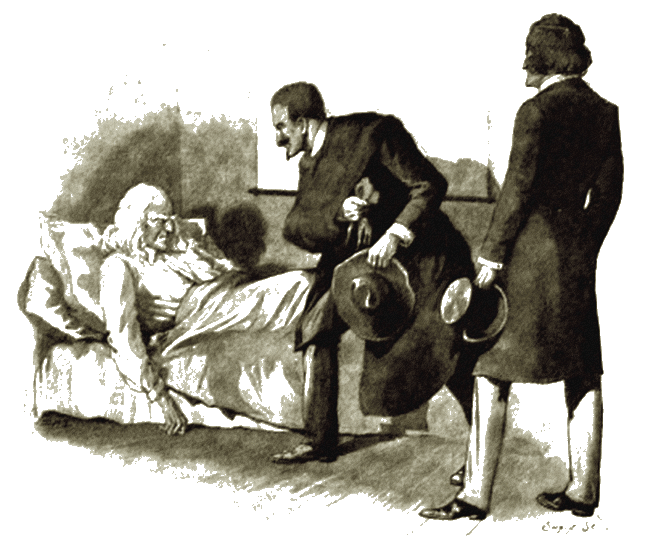
"This is Dr. Colonna, Prince," whispered Escassel.
With a smile upon his face, the Prince extended a wasted hand.
"It is extremely kind of you to come," he said. "It is but the wreck of what once was a man who lies before you, Dr. Colonna. When the child of my creation was strong enough to shift for itself it seemed to me that my life's work was done. And yet Serena ever had more need of me than at the present moment."
In another man the remark would have savoured of boundless egotism. From Frederickshal it seemed perfectly natural.
"I quite appreciate the situation," said Colonna.
"A man of your intellect would," said the Prince. "And yet I could save the situation. If I could be in my place in the Senate on Friday, if I could be myself for an hour, I would lash those unruly hounds into obedience. They would not dare to do other than I commanded them. Even now the Emperor is fearful to come near lest I should turn him from his purpose."
The words rang out clear as a trumpet call. Colonna could quite understand how this man had swayed a whole nation to his will. But the passion was transient; it left the Prince white and motionless for some time.
"But I am past all that," he resumed, presently. "You see the condition I am in. This cancer may take me off at any time—once the root touches my heart, I am done. But I am babbling like some selfish hypochondriac. Doctor, suppose my time is ordered for to-night. Could you give me some cordial, to keep life in me for three days?"
"I have a drug that would insure life for such a space," Colonna replied. Frederickshal's face brightened marvellously.
"Ah!" he exclaimed, "then the first step is gained. Escassel, would you mind leaving the Doctor and myself alone for a time?"
Escassel nodded, and withdrew. Prince turned eagerly to Colonna.
"You assure my life for three days," he said. "So far, so good. Now, you are a wonderful man, Colonna, and can do wonderful things. Doubtless, Escassel has given you some hint of what I require. That you have answered his questions in a satisfactory manner, I could see by his face as he came in. You can give me something which, for a time at least, will render me my old self again."
"I can, but the reverse of the medal is a terrible one."
"Speak on; few things have any terrors for me."
"Well, my secret cordial is a powerful and malignant poison. For two hours, say, you would feel a clearness, a power, and determination such as you never experienced in your life before. And then comes the awful reaction. Pains like the tortures of hell, an iron going into the heart, seconds like hours, until, finally, the blood, rushing to the heart, bursts that organ, and death comes."
Frederickshal smiled placidly.
"Is that all?" he asked. "I am not frightened by that picture. I am used to pain, and my end is near in any case. You will give me both those cordials, Doctor?"
"The first, certainly," said Colonna, "because it is a good and useful thing. But, as to the other, I quite fail to see—"
Frederickshal laughed low and pleasantly.
"Then I will tell you," he said. "I am going to make one last effort for my country. I shall be in my place once more, and I shall drive those fools to obey my will, as their fathers did before them. Doctor, shall Serena be saved? It shall! I can see the answer in your eyes."
THERE was nothing further to be done in the direction required by Frederickshal for the present beyond the administering of the potion necessary to insure life for a few days, which Colonna carried out without delay. He had his business to attend to, but he finally departed, with a promise to return at noon on the eventful Friday and give the poison destined to be fruitful of such dramatic results.
The second day was mapped out by the scientific congress for a country excursion, the programme being to return to Zeidfort by a special train at midnight. With no thought of any catastrophe in his mind, Colonna joined his party. The day was a pleasant one, and the company congenial, so that when the time to return arrived regrets were heard on every hand. The special train steamed into the small roadside station at length for the return journey, and the party went aboard. They dozed in the luxurious and brilliantly lighted carriages, dreaming of no evil—then there was a grinding shock, followed by an electric thrill, then a noise like thunder, and total darkness.
When Colonna came to himself again he was lying on his back on the grass, and some one was bending over him with a lantern. Fortunately the party had no lack of medical men amongst them.
"An accident, of course," Colonna murmured; "anybody killed?"
"No fatality," responded the other, "but several very badly shaken. There does not seem to be anything the matter with you beyond a shock. Fortunately, there is a hotel yonder, where most of our party are gone. The stationmaster tells me that we cannot possibly proceed till morning."
Colonna did not feel particularly interested. There was a racking pain in his head, and he was conscious of a desire to sleep. In a kind of daze he flung himself dressed upon a bed, and when he opened his eyes again the sun was riding high in the heavens. Colonna looked at his watch. It was nearly eleven. He bounded from the bed with a startled cry. He was ten miles from Zeidfort, and at twelve o'clock he had an engagement with Frederickshal.
Would it be possible to get there in time? Not by rail, certainly, for the line was not yet clear. It was just a chance that a pair of fleet horses might be secured.
"Twenty crowns if you can procure what I require and get me into Zeidfort within the hour," Colonna said to the bowing landlord.
Boniface protested that the thing should be done. Had he not a neighbour whose breed of horses was well known to all Serena? The good man bustled out, and presently returned with the information that the carriage was at the door. "The horses are a little fresh, Excellency," said the landlord, "but your driver is a man of experience. You will be safe in his hands."
Colonna did not readily forget that drive. A reckless coachman, and a pair of raw, half-broken animals stamped it on his memory. In the excitement of that adventure even Frederickshal was forgotten.
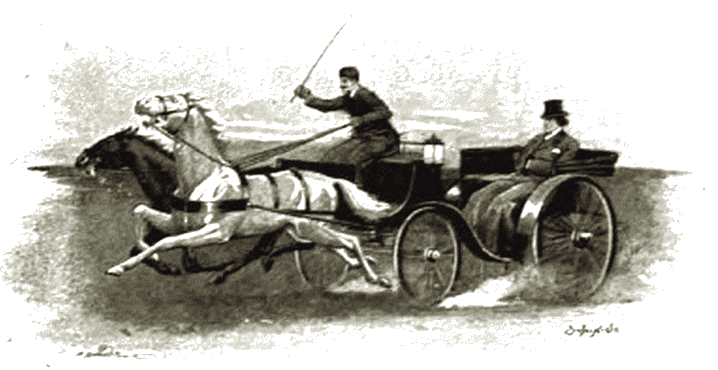
Colonna did not readily forget that drive.
Aching in every limb and trembling with fatigue, Colonna reached his hotel at length. A dose of brandy hastily gulped down restored him somewhat. Then Colonna began to be dimly aware that something unusual had happened. Most of the hotel blinds were down, people crept quietly along the streets. The handsome row of shops opposite the hotel was closely shuttered, over the municipal buildings a flag drooped at half-mast.
"What is wrong?" Colonna demanded of a waiter.
The man regarded his questioner in respectful astonishment. "Is it possible you do not know, Excellency?" he exclaimed. "Serena is in mourning; at the time when she needs him most, her hero is no more. Frederickshal is dead."
"Impossible!" Colonna cried. "When I saw—tell me everything."
"There is nothing to tell the gentleman. Yesterday afternoon at five o'clock the Prince passed away. Count Escassel was with him at the last."
Colonna walked down the steps of the hotel in a kind of dream. Surely his informant must have been mistaken. But here were the signs of woe on every hand.
"It must, it must be impossible," Colonna murmured. "That potion would have kept life in a corpse almost for the desired time. I shall not be satisfied until I have seen for myself. I can't believe that I have failed."
A minute later and Colonna was driving along in the direction of the palace Frederickshal had recently inhabited. It was a work of no small difficulty to get inside, but the desired end was attained at length, and an interview with Escassel obtained. The latter greeted Colonna half sadly, half reproachfully.
"I am not surprised," he said. "I was foolish to believe that any living man could defy the laws of Nature. We called you in too late. Your past successes have rendered you a little too sanguine, Doctor."
"I quite understand your feelings," Colonna said quietly. "But I am not prepared yet to admit that I am a failure."
"But, man alive, the Prince is dead!"
"In that case there is no more to be said. May I see him?"
"If you please. Frederickshal is already in his coffin. Like all great men, he had his striking peculiarities, and to have his coffin and grave-clothes ready was one of them. Also, the Prince desired to be buried on the third day in strict privacy here. The chapel grounds are consecrated."
"Quite so. Now how did the Prince die?"
"Suddenly at the end. I was talking to him as he lay in bed. Without the slightest warning, he stopped in the middle of a sentence, and then I saw he had passed away, as if a dagger had been driven into his heart."
Colonna's eyes gleamed. "Will you take me to the Prince without delay?" he demanded curtly.
Escassel complied, a little touched by the tone. On the truckle-bed in the meanly furnished room lay all that remained of Frederickshal, coffined and looking like some white statue in his ghostly cerements. As Colonna laid a finger reverently on the broad forehead he found it strangely cold.
"Give me some bright steel surface," he asked. "A sword blade will do."
Escassel took from the walls one of Frederickshal's many presentation swords. The face shone like liquid moonlight. For fully five minutes Colonna held the blade across the Prince's mouth. As he examined it carefully, his face grew bright.
"What do you see there?" he asked Escassel.
"A slight beady moisture," said the Count. "That steel is cold."
"Colder than the Prince," Colonna said significantly. "There is still breath in his body. I felt sure there was some strange error here."
"But the pulse is still, the heart does not beat, and two doctors—" Colonna waved the suggestion impatiently aside.
"Have I not proved to you that there is life in that body?" he demanded. "When I administered that cordial, dissolution must have been very near at hand. Death and my potion are fighting for the mastery in that unconscious form, and between them have produced a form of catalepsy. The cordial will win yet, but we must assist it. Is there an electric battery here?"
"There are several in the laboratory," Escassel replied. "Shall I get one?" Colonna nodded curtly.
Escassel returned presently with the instrument, and the doctor got swiftly to work. The limp form was lifted from the coffin and laid upon the bed. For over an hour, with compressed lips and knitted brow, Colonna slaved on. At the end of that time his patience was rewarded. Across Frederickshal's face a twitching spasm passed. Then the chest heaved, and a long quivering sigh came from the white lips. Frederickshal opened his eyes and smiled.
"You were only just in time, Doctor," he whispered.
"You knew what was going on?" Colonna asked.
"Yes, yes. Something yesterday seemed to take me suddenly and turn me to ice. I was powerless to move a muscle, or even to breathe, and yet I heard everything and knew everything that was going on around me."
Colonna explained once more the cause of the cataclysm. Then in his sternest manner he bade Frederickshal to be silent.
"You are at the lowest ebb," he said, "the slightest exertion may undo everything. We have ample time yet to bring about the end you have in view. You will lie perfectly still there till the Count and myself return."
The Prince signified obedience, and Colonna, followed by Escassel, hurried from the room.
The latter no longer troubled to conceal his anxiety. "We shall be too late," he said. "It is now past two, and by four o'clock the division must be taken in the Senate. In view of the supposed death of the Prince, the proceedings will of necessity be brief."
"You will see the old Frederickshal in an hour," said Colonna. "Procure me a glass of boiling water without delay."
The liquor was procured, and into it Colonna proceeded to drop three spots of some liquid, which immediately turned the liquor in the tumbler to something like blood. With his own hands he placed it to the lips of Frederickshal, until the last drop was exhausted. The tumbler he literally smashed into a thousand pieces.
"Lie there till you feel ready to rise," he commanded, "it is best for you to be alone."
In the outer room Escassel stood by the wall, his ear to the telephone receiver. His face was given over to restless anxiety.
"The Senate is sitting," he said. "Count Artem is summing up for the peace party, and Prince Zanoff will reply for us. The Emperor is present. A little less than an hour will decide the future of Serena."
Colonna smiled as one does who humours a child. "You are naturally very anxious?" he asked.
"You put it mildly," Escassel exclaimed. "There are no tortures like those of a mind upon the rack. And a whole hour to wait."
The minutes passed slowly as Escassel paced the floor. The hands of the clock crept round, five minutes only remained. At that moment the telephone bell jangled. Escassel listened eagerly for a minute.
"By Heaven," he cried, "Artem has finished and Zanoff is not there. He has been tampered with. I have suspected his fidelity for some time past. They have adjourned for a quarter of an hour, failing Zanoff's presence. We are lost."
A loud cry came from the doorway. Escassel staggered and clutched the back of a chair as his eyes fell upon the striking spectacle. Frederickshal stood there tall and erect in his clinging cerements. He was the same, and yet so wonderfully different. The white mane and bushy eyebrows, the in numerable lines on the parchment face remained, but the eye flashed with all the latent fire of youth, there was an easy motion of the limbs, the mouth was firm and hard.
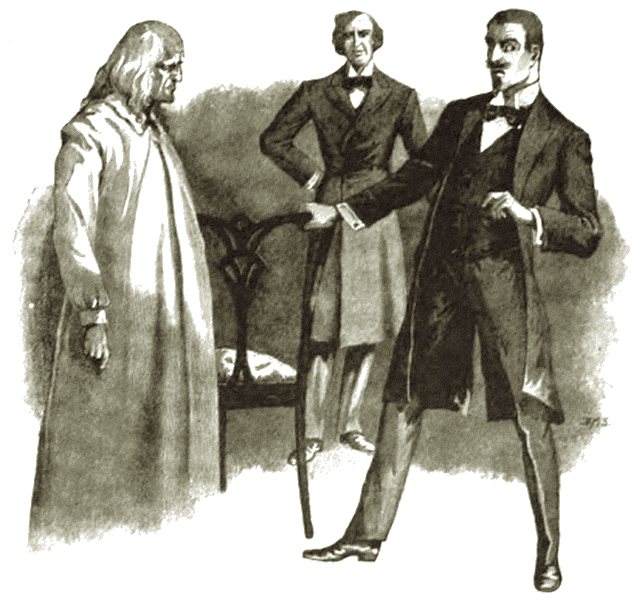
Frederickshal stood there tall and erect in his clinging cerements.
"Frederickshal come back to his prime!" Escassel cried.
"I am myself and more than myself," the Prince replied. "I have heard what has happened. Escassel, a long cloak, my shoes and a hat at once. A carriage quickly."
Escassel clattered like a flash down the stone stairs.
THERE was but scant sympathy with the peace party in Zeidfort itself. In that centre of education and thought the people were more enlightened; and add to this Zeidfort was the home of those industries that depend upon things military for prosperity.
A vast, sullen crowd had gathered about the Senate House on that eventful Friday afternoon. The ultimate issue of that mad measure was practically decided already, but hope ever springs eternal in the human breast, and after all there was just a chance that some stroke of fate might fall for Serena.
As the Senators arrived they were greeted either with loud cheers or passed along in chill silence cut with a hiss or two here and there until the Chamber was filled. Presently a brilliant equipage with outriders flashed through the crowd. It was the Emperor Ferdinand smiling in anticipation of his welcome.
But no cheer arose. Every hat there was doffed with cold politeness amidst a silence that, like the darkness of Egypt, could be felt. A sudden wave of colour swept over the Emperor's sensitive features. Vanity and egotism formed no small part of his nature, and their reception cut him to the quick. Then he smiled bitterly. These disloyal people should suffer for this in the time to come.
Still the crowd lingered on there, increasing in density as time passed. They could catch now and then the rise and swell of cheers in the Senate Chamber, and as a hired vehicle with the blinds down passed through them and deposited a cloaked form on the steps, they took no heed.
Meanwhile, followed by Escassel and Colonna, Frederickshal passed into the Chamber. The place was dimly lighted so that the entrance of the party passed notice. The Prince, still cloaked and hatted, stepped into a seat, while Escassel conducted Colonna to a balcony where he could witness the crux of the drama.
"I will come back to you afterwards," whispered the Count. "Meanwhile, my place is there. As I feared, Zanoff has betrayed us."
Indeed, it looked as if the militant party had been abandoned. Impatient cries for Zanoff rose from the Left, but no Zanoff responded. With a smile upon his lips, Artem rose to move that the Chancellor put the question.
"Our opponents have recognised the hopelessness of their position, and abandoned it," he said. "This is a striking example of the saying that Peace has her victories no less renowned than War. I will be brief, sir, and all the more so because the great champion of an effete party is no more. His voice will nevermore be heard—"
"You are mistaken. I am here to save my country," and Frederickshal's voice rang out loud and clear.
Artem dropped, as if shot, into his seat. A sudden burst of sunshine filled the chamber. Frederickshal threw off his cloak and hat, and stood there with his grave clothes still about him. Just for an instant the audience seemed to be petrified. Then a painful thrill of horror and amazement filled the chamber. A shout went up from the assembly. Was it a spirit standing there before them!
"On be half of my party," Frederickshal said, "I demand to be heard."
The Chancellor signified assent. He could not have spoken for a king's ransom. Artem was the first to recover himself. "What means this mummery?" he said. "Who are you who dare to come here in the guise of the distinguished dead?"
"It is seven years since I last sat here," the Prince replied, "and there are many here who can remember me in those days."
"The Prince," came an impatient chorus. "Let the Prince speak." Artem collapsed into his seat again.
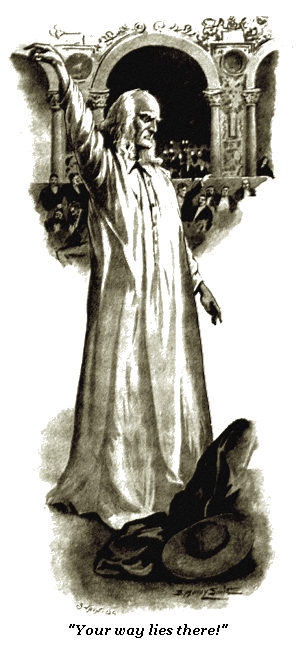
Then Frederickshal commenced his oration. He was cold, dispassionate, and full of argument at first, afterwards he warmed to his work. For a full hour he spoke; he held the audience in the hollow of his hand. As he rose to heights of contemptuous scorn, it was easy to see that victory would follow. He made no appeal; he simply tore the flimsy sophistry to pieces; he bade the rebels bend to his will, and they cowered in sheep- like obedience.
"I have finished," he said at length; "my day is done, my sun has set. By this time to-morrow I shall have passed a way. But not before I have seen you obedient to those who know better than yourselves. And as to yonder poor puppet who feebly holds the reins of government, this so-called Emperor, had I time before me I would give him such a lesson—"
Frederickshal paused. A terrible spasm crossed his face. The Emperor, hidden behind the pillar, made no sign. The Frederickshal concluded:
"Go," he said, "go every poor creature of you and do my bidding. Your way lies there."
He pointed to his own side of the House. Presently a bell rang somewhere, and the two parties streamed out to return later. Someone passed a piece of paper up to the Chancellor, who read the fateful figures to the House:
"For the Bill: 89. Against: 481. Majority: 392."
Frederickshal had conquered. His marvellous personality had
swayed the human cattle before him. The elections were near, and
Serena would never permit such a danger to threaten her again. A
faithful few gathered round the Prince, but he saw them
not—their congratulations fell on dead ears. Already the
eagle eye was glazing; the aged body was racked with awful
pain.
Colonna and Escassel stood one on either side of the sufferer. Despite the agony he was enduring, he had a smile for the former.
"Give me your hand," he said. "What a debt of gratitude my country owes you! Doctor, you are a far greater man than I ever could have been. I thank——"
He stopped. The paroxysm of pain gave place to a placid calm. A thin stream of blood trickled from the rigid lips, the grey head fell back.
"Is this the end?" Escassel whispered.
"Yes," said Colonna, "thus has the hero died."